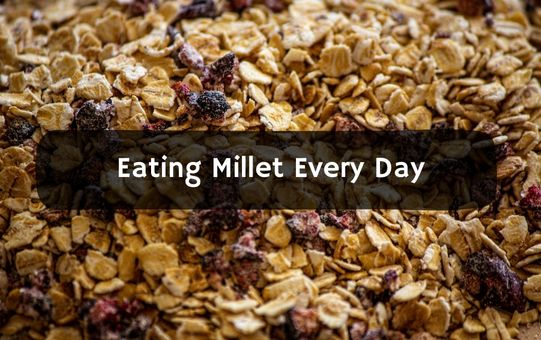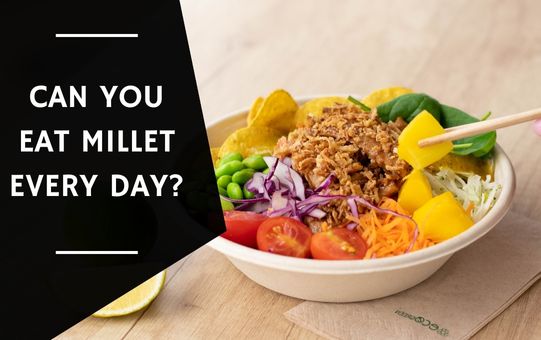Are you unsure if millet is safe or beneficial, or if can you eat millet every day? This ancient grain has numerous potential health benefits, including a high nutrient and fiber content and the absence of gluten.
A grain rich in nutrients and with a number of potential health advantages is millet. However, it might not be suitable for everyone, and it’s important to eat a variety of foods to get enough of each nutrient. Before making significant dietary changes, speak with a medical professional.
This article will discuss the potential benefits and drawbacks of consuming millet on a daily basis.
Contents
Why Can You Eat Millet Every Day Matter?
Eating millet every day may be important for a number of reasons. Firstly, millet is a highly nutritious grain that is a good source of protein, fiber, B vitamins, and minerals such as magnesium and phosphorus.
Incorporating millet into your diet on a daily basis can help ensure that you are meeting your nutritional needs and getting the necessary nutrients to support overall health and well-being.
Another reason why eating millet every day may matter is that it is gluten-free, making it suitable for those with celiac disease or gluten intolerance. This can be a great alternative to wheat-based grains for those who need to avoid gluten in their diet.
There is also some evidence to suggest that millet may have potential health benefits beyond its basic nutritional content. Some studies have found that consuming millet may help lower cholesterol and blood pressure levels.
However, it’s important to note that more research is needed to fully understand the potential health benefits of millet and how it compares to other grains.
Overall, while it is important to vary your diet and include a variety of different foods, incorporating millet into your diet on a daily basis can be a nutritious and healthful choice.
As with any major changes to your diet, it’s a good idea to consult with a healthcare professional before making any decisions.
Read Also: Can You Eat Millet Flakes Raw?
Benefits of Eating Millet
One of the main benefits of eating millet is that it is high in nutrients and fiber. One cup of cooked millet contains about 6 grams of protein, 3 grams of fiber, and a variety of B vitamins and minerals. The protein and fiber in millet can help keep you feeling full and satisfied, which can be helpful for weight management.
Another benefit of millet is that it is gluten-free, making it suitable for those with celiac disease or gluten intolerance. This can be a great alternative to wheat-based grains for those who need to avoid gluten in their diet.
There is also some evidence to suggest that millet may have potential health benefits beyond its basic nutritional content. Some studies have found that consuming millet may help lower cholesterol and blood pressure levels.
However, it’s important to note that more research is needed to fully understand the potential health benefits of millet and how it compares to other grains.
Considerations for Eating Millet Every Day
While there are certainly some potential benefits to eating millet every day, there are also some considerations to keep in mind. One potential issue is that millet can be difficult to digest if it is not properly prepared.
To make millet easier on the digestive system, it is important to rinse the grains thoroughly and soak them for a few hours before cooking. This can help reduce the phytic acid content of the millet, which can interfere with the absorption of certain nutrients.
Another consideration is the need to vary your diet to ensure that you are getting a wide range of nutrients. While millet is a nutritious grain, it is not a complete protein and may not provide all of the amino acids your body needs. It’s
important to include a variety of other protein sources in your diet, such as legumes, nuts, and seeds, in order to ensure that you are meeting your nutritional needs.
Additionally, it’s worth noting that millet may not be suitable for everyone. Some people may find that they have sensitivities or allergies to certain grains, including millet.
If you have any concerns about your ability to tolerate millet, it’s a good idea to consult with a healthcare professional before making any major changes to your diet.

How to Incorporate Millet into Your Diet?
If you’re interested in incorporating millet into your diet, there are a few tips to keep in mind when preparing and cooking it. First, be sure to rinse the grains thoroughly and soak them for a few hours before cooking to help reduce the phytic acid content.
To cook millet, bring a pot of water to a boil and add the rinsed and soaked grains. Reduce the heat to a simmer and cook the millet for about 20-25 minutes, or until it is tender and the water is absorbed. You can also add broth or other liquid to the pot for added flavor.
Once the millet is cooked, you can use it in a variety of recipes or as a substitute for other grains in your meals. Some ideas for incorporating millet into your diet include adding it to soups and stews, using it as a base for grain bowls, or using it as a replacement for rice or quinoa in salads.
You can also use millet flour in baking recipes to add a unique flavor and texture to your baked goods.
Read Also: Is Finger Millet And Millet The Same?
Can you eat uncooked millet?
Yes, you can eat uncooked millet, but it is not recommended as it can be difficult to digest and may also contain certain anti-nutrients that can interfere with nutrient absorption.
Millet is a type of cereal grain that is commonly used in many cultures as a staple food. It can be consumed cooked, as a porridge, or in baked goods.
While it is possible to eat uncooked millet, it is generally not recommended as the raw grain can be tough and difficult to digest. It is also important to note that uncooked millet may contain phytic acid, which is an anti-nutrient that can interfere with the absorption of certain nutrients in the body, such as iron, calcium, and zinc.
Therefore, it is best to cook millet before consuming it, as cooking helps to break down the tough outer layer and reduces the levels of anti-nutrients, making it easier to digest and more nutritious.
Conclusion
Millet is a highly nutritious grain with a variety of potential health benefits. However, it’s important to keep in mind that it may not be suitable for everyone and that it is important to vary your diet to ensure an adequate intake of all nutrients.
If you are interested in incorporating millet into your diet, be sure to rinse and soak the grains before cooking to help improve digestibility, and consider consulting with a healthcare professional before making any major changes to your diet.
FAQs | Eat Millet every day
Here are a few FAQs related to eating millet every day:
Is It Safe To Eat Millet Every Day?
Overall, millet is a highly nutritious grain that can be a safe and healthful addition to your diet when consumed in moderation.
However, it’s important to keep in mind that it may not be suitable for everyone, and it’s a good idea to consult with a healthcare professional before making any major changes to your diet.
Can Eating Millet Every Day Help With Weight Loss?
Millet is a good source of fiber, which can help keep you feeling full and satisfied, potentially aiding in weight loss. However, it’s important to remember that weight loss is dependent on a variety of factors, including overall calorie intake and exercise habits.
Is Millet A Complete Protein?
Millet is not a complete protein, meaning it does not contain all of the essential amino acids that your body needs. It’s important to include a variety of other protein sources in your diet, such as legumes, nuts, and seeds, in order to ensure that you are meeting your nutritional needs.
Can millet lower cholesterol and blood pressure levels?
Some studies have found that consuming millet may help lower cholesterol and blood pressure levels. However, it’s important to note that more research is needed to fully understand the potential health benefits of millet and how it compares to other grains.
How Should I Prepare Millet To Make It Easier To Digest?
To make millet easier on the digestive system, it is important to rinse the grains thoroughly and soak them for a few hours before cooking. This can help reduce the phytic acid content of the millet, which can interfere with the absorption of certain nutrients.

